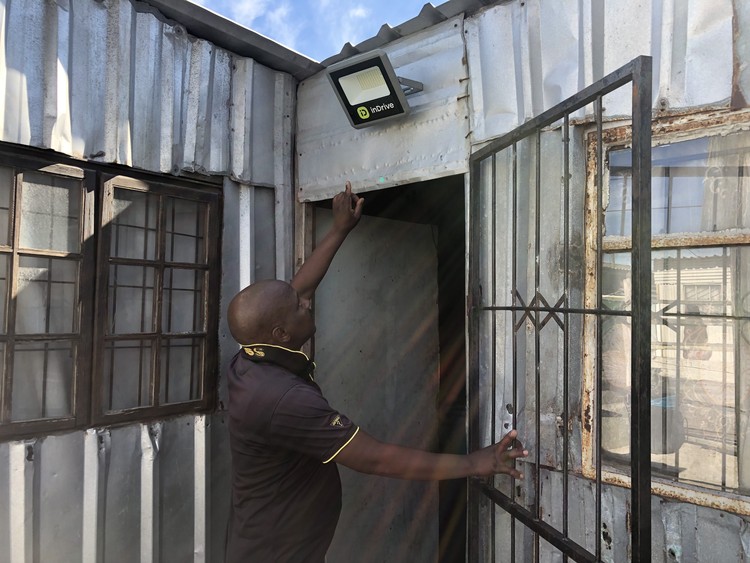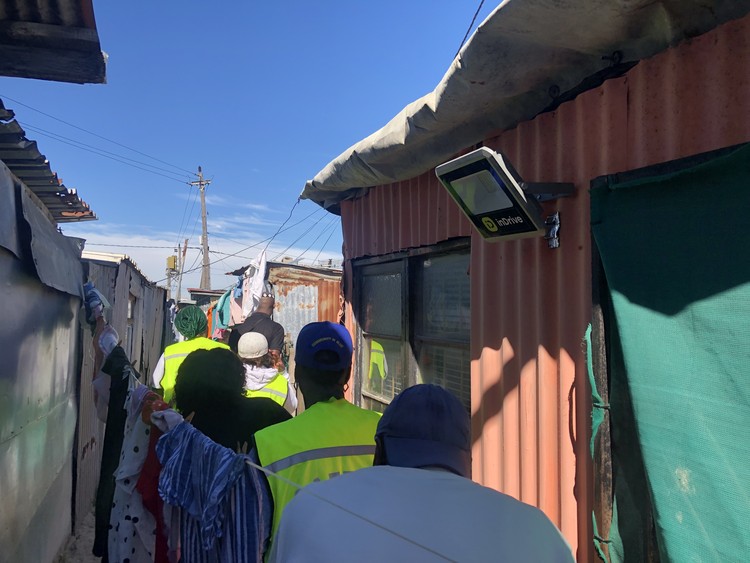Solar lights mean shack dwellers can walk to the toilet at night
About 75 households in Khayelitsha were given solar street lights in a move to make the area safer
Khayelitsha resident Bongani Mpako was provided with a solar light as part of a community project with local business. Photos: Mary-Anne Gontsana
The 20-metre-high mast light in the yard of Khayelitsha resident Bongani Mpako’s home has not been working consistently for two weeks.
Last week, the Mpako family was among those in Site B that received 75 solar streetlights in the hope of improving safety in the community.
“The high-mast light goes on and off. We report it, and workers come out to fix it, but a few weeks later it is off again,” says Mpako.
Mpako, who has lived in one of the many densely populated informal settlements in Site B for several years, believes that poor lighting increases the risk of violent crime.
The 75 solar lights were installed through a partnership between community organisations in Khayelitsha, the People’s Environmental Planning and LightUp, and e-hailing service inDrive.
The light above Mpako’s front door has a solar panel secured onto his roof. The light switches on when the sun sets and goes off automatically at daybreak.
Vincent Lilane of inDrive said, “Our drivers complained that they could not work in Khayelitsha at night. And that’s when we decided to put up lights.”
Some of the solar lights have been placed in strategic spots to light pathways between shacks.
Resident Ntombi Soya said she could finally walk to the toilet at night safely. “Lighting has been one of the biggest issues here,” she said.
The City of Cape Town says it is also looking into solar-powered lighting for informal settlements as part of its new Urban Energy Poverty Alleviation Programme.
“The City and its partners have been in a number of communities to assist residents with solar lighting solutions. In the City’s supply areas, almost 100% of the older informal settlements have been electrified. But there are many existing and newer settlements on land where it is not possible to electrify, such as on wetlands, in ponds or nature reserves,” said Mayco member for energy, Beverley van Reenen.
Support independent journalism
Donate using Payfast

Don't miss out on the latest news
We respect your privacy, and promise we won't spam you.
Next: Khayelitsha Music Academy hopes to change lives
Previous: No water for cooking or washing: KwaNobuhle families battle system breakdown
© 2024 GroundUp. This article is licensed under a Creative Commons Attribution-NoDerivatives 4.0 International License.
You may republish this article, so long as you credit the authors and GroundUp, and do not change the text. Please include a link back to the original article.
We put an invisible pixel in the article so that we can count traffic to republishers. All analytics tools are solely on our servers. We do not give our logs to any third party. Logs are deleted after two weeks. We do not use any IP address identifying information except to count regional traffic. We are solely interested in counting hits, not tracking users. If you republish, please do not delete the invisible pixel.


